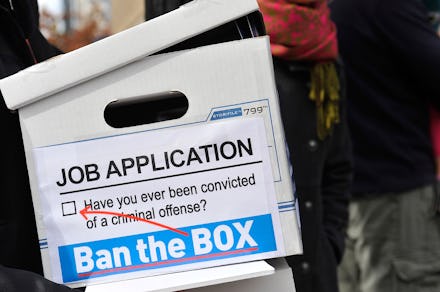People with criminal convictions could soon have a better shot at employment in LA County

If you’re a job applicant with a criminal record, research has shown you’re significantly less likely to be hired. Your potential employers are also more likely to associate you with a host of negative qualities, including tardiness and drug and alcohol issues.
However in Los Angeles County — home to more than 10 million people — it could soon become easier for people with criminal records to get a fair shot.
The LA County Board of Supervisors on Tuesday directed officials to create a plan for establishing so-called “fair chance” ordinances, the Los Angeles Times reported. The ordinances might include banning any employers that contract with the county from asking applicants about their criminal record until after a “conditional offer” is made.
There is already a California state law that prevents public employers from including a question about criminal records on initial job applications, according to the LA Times. In the cities of Los Angeles and San Francisco, these so-called “ban the box” policies — a reference to a box that must be checked if an applicant has a criminal record — also apply to private companies.
The growing “ban the box” movement
These “ban-the-box” policies, which delay or prevent some employers from asking about an applicant’s criminal history, are already in place in over 150 cities and counties across the United States, according to the National Employment Law Project. According to the NELP, such policies encourage employers to “consider a job candidate’s qualifications first, without the stigma of a criminal record.”
In 2015, then-President Barack Obama announced an executive action preventing the federal government from asking job applicants about their criminal records at the outset of the application process.
“The federal government should not use criminal history to screen out applicants,” Obama said at the time, Slate reported. “We can’t dismiss people out of hand simply because of a mistake they made in the past.”
Why does it matter?
Research by the National Institute of Justice showed that between 60% and 75% of former offenders cannot find work in their first year after being released. Advocates for fair-chance policies say this ongoing unemployment has a negative impact not only on the people themselves, but on the whole community.
Sandra Johnson, a policy fellow at the advocacy organization Legal Services for Prisoners With Children who herself is formerly incarcerated, said in an interview that policies that help people with criminal histories get jobs should be “a top priority.”
“For a formerly incarcerated person, a job is public safety, it’s income to take care of you and your family, it restores your confidence,” Johnson said in a phone call on Friday.
“If I live in a community and I have a job, I’m giving back to my community ... I’ll be able to spend money in stores, I’ll be able to pay my taxes,” Johnson said. “It makes the community safer, it’s public safety.”
Lily Gonzalez, who was released from a California state prison in 2012, told the Los Angeles Times on Wednesday that having a criminal record kept her isolated, preventing her from finding the work she needed to support her goals after her release.
“I applied for jobs everywhere,” she said. “I’d go in for an interview, and they’d be reviewing my resume, and then they’d get to the application and see the box [asking about a criminal record] … and just in their body language you could see they weren’t interested anymore.”
Tuesday’s vote could lead to changes for Gonzalez and others like her in LA County.
During the discussion of the motions, Mark Ridley-Thomas, a member of the County Board of Supervisors, talked about why the policy change is so important.
“Once someone has paid his or her debt to society, they ought to be afforded the opportunity to become productive citizens in the context of their respective communities,” he said.